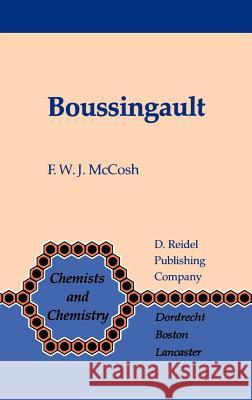Boussingault: Chemist and Agriculturist » książka
Boussingault: Chemist and Agriculturist
ISBN-13: 9789027716828 / Angielski / Twarda / 1984 / 280 str.
It was the British music critic Neville Cardus, writing on Debussy, who remarked how "the great sea of Wagner threatened to overwhelm the world of nineteenth century music". 1 There is an analogy in mid-nineteenth- century agriculture where the great sea of Justus von Liebig developed a tidal wave which to this day conceals much of the original work and merit of others in the same field. Not only the general public but even students of agriculture may, or may not, recall the names of Persoz, Kuhlmann and Ville in France, Thaer and Sprengel in Germany, or even Lawes and Gilbert in England, to mention a few of them, whose pioneer works were not pub- licised in the same didactic and polemical manner as those of Liebig. Among such pioneers was Jean Baptiste Boussingault (1802-1887) whose funda- mental researches contributed to the emergence of agriculture from an empirical corpus of facts to the status of a science. Yet apart from his work in animal and crop science he also engaged in metallurgical investigations, biology and pure chemistry. The scientific world was already approaching the end of an era in which it was possible to embrace several disciplines adequately. With increasing specialisation, institutionalism and profeSsionalism in science the polymath was a gradually disappearing species.











